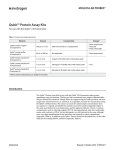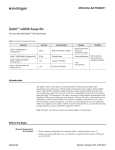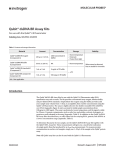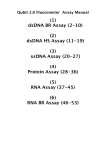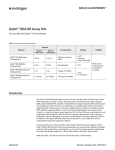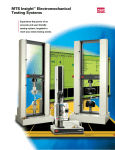Download Qubit® Protein Assay Kits
Transcript
Qubit® Protein Assay Kits For use with the Qubit® 2.0 Fluorometer Table 1. Contents and storage information Material Amount Concentration Storage* Qubit® protein reagent (Component A) 300 μL or 1.5 mL 200X concentrate in 1,2-propanediol • Room temperature • Desiccate • Protect from light Qubit® protein buffer (Component B) 60 mL or 300 mL Not applicable • Room temperature Qubit® protein standard #1 (Component C) 1 mL or 5 mL 0 ng/μL in TE buffer with 2 mM sodium azide Qubit® protein standard #2 (Component D) 1 mL or 5 mL 200 ng/μL in TE buffer with 2 mM sodium azide Qubit® protein standard #3 (Component E) 1 mL or 5 mL 400 ng/μL in TE buffer with 2 mM sodium azide • ≤4°C * When stored as directed, kits are stable for 6 months. Introduction The Qubit® Protein Assay Kits for use with the Qubit® 2.0 Fluorometer make protein quantitation easy and accurate. The kits provide concentrated assay reagent, dilution buffer, and pre-diluted BSA standards. Simply dilute the reagent using the buffer provided, add your sample (any volume from 1–20 μL is acceptable), then read the concentration using the Qubit® 2.0 Fluorometer. The assay is accurate for initial sample concentrations from 12.5 μg/mL to 5 mg/mL and exhibits low protein-to-protein variation (Appendix, Figure 1). The assay is performed at room temperature, and the signal is stable for 3 hours. Common contaminants, such as reducing reagents (DTT, β-mercaptoethanol), salts, free nucleotides, amino acids, solvents, or DNA, but not detergents, are well tolerated in the assay; some very slight modifications for the procedure are required for other contaminants (Appendix, Table 2). In addition to the Qubit® Protein Assay Kits described here, we also offer other kits for assaying dsDNA and RNA (Appendix, Table 3). MAN0002349 Revised: 4–August–2011 | MP 33211 Before You Begin Materials required but not provided Storing the Qubit® Protein Assay Kits Critical assay parameters • Plastic container (disposable) for mixing the Qubit® working solution (step 1.3) • Qubit® assay tubes (500 tubes, Cat. no. Q32856) or Axygen PCR-05-C tubes (VWR, part no. 10011-830) The Qubit® protein reagent and buffer are designed for room temperature storage. The Qubit® protein reagent is supplied in DMSO, which freezes at temperatures lower than room temperature. Store the protein standards at 4˚C. Assay temperature The Qubit® protein assay for the Qubit® 2.0 Fluorometer delivers optimal performance when all solutions are at room temperature (22–28°C). The Qubit® assays were designed to be performed at room temperature, as temperature fluctuations can influence the accuracy of the assay (Appendix, Figure 2). To minimize temperature fluctuations, store the Qubit® protein reagent and the Qubit® protein buffer at room temperature and insert all assay tubes into the Qubit® 2.0 Fluorometer only for as much time as it takes for the instrument to measure the fluorescence; the Qubit® 2.0 Fluorometer can raise the temperature of the assay solution significantly, even over a period of a few minutes. Do not hold the assay tubes in your hand before reading, as this will warm the solution and result in a low reading. Incubation time To allow the Qubit® protein assay to reach optimal fluorescence, incubate the tubes for 15 minutes after mixing the sample or standard with the working solution. After this incubation period, the fluorescence signal is stable for 3 hours at room temperature. For greatest accuracy of the protein assay, the incubation time of the samples should be within 10 minutes of the incubation time of the standards. Photobleaching of the Qubit® reagent The Qubit® reagents exhibit high photostability in the Qubit® 2.0 Fluorometer, showing <0.3% drop in fluorescence after 9 readings and <2.5% drop in fluorescence after 40 readings. It is important to remember, however, that if the assay tube remains in the Qubit® 2.0 Fluorometer for multiple readings, a temporary reduction in fluorescence will be observed as the solution increases in temperature (Appendix, Figure 2). Note that the temperature inside the Qubit® 2.0 Fluorometer may be as much as 3°C above room temperature after 1 hour. For this reason, if you want to perform multiple readings of a single tube, you should remove the tube from the instrument and let it equilibrate to room temperature for 30 seconds before taking another reading. Calibrating the Qubit® 2.0 Fluorometer For each assay, you have the choice to run a new calibration or to use the values from the previous calibration. As you first use the instrument, perform a new calibration each time. As you become familiar with the assays, the instrument, your pipetting accuracy, and significant temperature fluctuations within your laboratory, you should determine the level of comfort you have using the calibration data stored from the last time the instrument was calibrated. Remember also that the fluorescence signal in the tubes containing standards and the samples is stable for no longer than 3 hours. See Figure 3 in the Appendix for an example of the calibration curve used to generate the quantitation results. Qubit® Protein Assay Kits | 2 Handling and disposal No data are currently available addressing the mutagenicity or toxicity of the Qubit® protein reagent (Component A). This reagent is an organic dye and is provided as a solution in 1,2-propanediol. Treat the Qubit® protein reagent with the same safety precautions as other materials with similar properties and dispose of the dye in accordance with local regulations. Experimental Protocol The protocol below assumes that you are preparing standards for calibrating the Qubit® 2.0 Fluorometer. If you plan to use the last calibration performed on the instrument, you need fewer tubes (step 1.1) and less working solution (step 1.3). More detailed instructions on the use of the Qubit® 2.0 Fluorometer (corresponding to steps 1.9–1.12 and 2.1–2.6) can be found in the user manual accompanying the instrument. 1.1 Set up the required number of 0.5-mL tubes for standards and samples. The Qubit® protein assay requires 3 standards. Note: Use only thin-wall, clear, 0.5-mL optical-grade real-time PCR tubes. Acceptable tubes include Qubit® assay tubes (500 tubes, Cat. no. Q32856) or Axygen™ PCR-05-C tubes (VWR, part no. 10011-830). 1.2 Label the tube lids. Note: It is important to label the lid of each standard tube correctly as calibration of the Qubit® 2.0 Fluorometer requires that the standards be introduced to the instrument in the right order. 1.3 Make the Qubit® working solution by diluting the Qubit® protein reagent 1:200 in Qubit® protein buffer. Use a clean plastic tube each time you make the Qubit® working solution. Do not mix the working solution in a glass container. Note: The final volume in each tube must be 200 μL. Each standard tube requires 190 μL of Qubit® working solution, and each sample tube requires anywhere from 180–199 μL. Prepare sufficient Qubit® working solution to accommodate all standards and samples. For example, for 7 samples, prepare enough working solution for the samples and 3 standards: ~200 μL per tube in 10 tubes yields 2 mL of working solution (10 μL of Qubit® reagent plus 1990 μL of Qubit® buffer). 1.4 Load 190 μL of Qubit® working solution into each of the tubes used for standards. 1.5 Add 10 μL of each Qubit® standard to the appropriate tube, then mix by vortexing 2–3 seconds. Be careful not to create bubbles. Note: Careful pipetting is critical to ensure that exactly 10 μL of each Qubit® protein standard is added to 190 μL of Qubit® working solution. 1.6 Load Qubit® working solution into individual assay tubes so that the final volume in each tube after adding sample is 200 μL. Note: Your sample can be anywhere from 1–20 μL, therefore, load each assay tube with a volume of Qubit® working solution anywhere from 180–199 μL. 1.7 Add each of your samples to the assay tubes containing the correct volume of Qubit® working solution (prepared in step 1.6), then mix by vortexing 2–3 seconds. The final volume in each tube should be 200 μL. Qubit® Protein Assay Kits | 3 1.8 Allow all tubes to incubate at room temperature for 15 minutes. 1.9 On the Home Screen of the Qubit® 2.0 Fluorometer, press Protein. The Standards Screen is displayed. Note: If you have already performed a calibration for the selected assay, the Qubit® 2.0 Fluorometer prompts you to choose between reading new standards and using the previous calibration. See Calibrating the Qubit® 2.0 Fluorometer above for calibration guidelines. 1.10 On the Standards Screen, select to run a new calibration or to use the last calibration: Press Yes to run a new calibration, then: Insert the tube containing Standard #1 in the Qubit® 2.0 Fluorometer, close the lid, then press Read. The reading takes approximately 3 seconds. Remove Standard #1. Insert the tube containing Standard #2 in the Qubit® 2.0 Fluorometer, close the lid, then press Read. Remove Standard #2. Insert the tube containing Standard #3 in the Qubit® 2.0 Fluorometer, close the lid, then press Read. Remove Standard #3. OR Press No to use the last calibration. The Sample Screen is displayed. Insert a sample tube into the Qubit® 2.0 Fluorometer, close the lid, then press Read. After the measurement is completed, the result is displayed on the screen. Note: The value given by the Qubit® 2.0 Fluorometer at this stage corresponds to the concentration after your sample was diluted into the assay tube. You can record this value and perform the calculation yourself to find out the concentration of your original sample (see Calculating the concentration of your sample below) or the Qubit® 2.0 Fluorometer performs this calculation for you (see Dilution Calculator on page 5). 1.11 To read the next sample, remove the sample from the Qubit® 2.0 Fluorometer, insert the next sample, then press Read Next Sample. 1.12 Repeat sample readings until all samples have been read. Calculating the concentration of your sample The Qubit® 2.0 Fluorometer gives values for the Qubit® protein assay in μg/mL. This value corresponds to the concentration after your sample was diluted into the assay tube. To calculate the concentration of your sample, use the following equation: Concentration of your sample = QF value × (200 ) x where QF value = the value given by the Qubit® 2.0 Fluorometer x = the number of microliters of sample you added to the assay tube This equation generates a result with the same units as the value given by the Qubit® 2.0 Fluorometer (that is, if the Qubit® 2.0 Fluorometer gave a concentration in μg/mL, the result of the equation will be in μg/mL). Qubit® Protein Assay Kits | 4 Dilution Calculator 2.1 After the sample measurement is completed, press Calculate Stock Conc. The Dilution Calculator Screen containing the volume roller wheel is displayed. 2.2 Using the volume roller wheel, select the volume of your original sample that you added to the assay tube. When you stop scrolling, the Qubit® 2.0 Fluorometer calculates the original sample concentration based on the measured assay concentration. 2.3 To change the units in which the original sample concentration is displayed, press μg/mL. A pop-up window opens, showing the current unit selection (indicated by a red dash). 2.4 Select the unit for your original sample concentration by touching the desired unit in the unit selection pop-up window. To close the unit selection pop-up window, touch anywhere on the screen outside the pop-up. The Qubit® 2.0 Fluorometer automatically converts the units to your selection once the unit selection pop-up window is closed. Note: The unit button next to your sample concentration reflects the change in the units (for example, if you change the unit to pg/μL, the button displays pg/μL). 2.5 To save the data from your calculation to the Qubit® 2.0 Fluorometer, press Save on the Dilution Calculator screen. The last calculated value of your measurement will be saved as a *.csv file and tagged with a time and date stamp. 2.6 To exit the Dilution Calculator screen, press any navigator button on the bottom of the screen or Read Next Sample. Note: When you navigate away from the Dilution Calculator screen, the Qubit® 2.0 Fluorometer saves the last values for the sample volume and the units in the Dilution Calculator screen only. Returning to the Dilution Calculator screen displays these last selected values. Appendix Protein-to-protein variation of the Qubit® Protein Assay Figure 1. Low protein-to-protein variation in the Qubit® protein assay (Q33211, Q33212). Solutions of the following proteins were prepared, diluted, and assayed in the Qubit® protein assay: bovine serum albumin (BSA), chicken-egg ovalbumin, chicken-egg lysozyme, bovine-milk β-casein, equine myoglobin, bovine-milk α-casein, porcine pepsin, mouse immunoglobulin (IgG), and calf-thymus histone. Fluorescence was measured at 485/590 nm and plotted versus the mass of the protein sample. At 3 μg, the fluorescence variation was 12.4%, or 8.7% excluding the basic histone protein. Background fluorescence has not been subtracted. Qubit® Protein Assay Kits | 5 Relative fluorescence (normalized to room temperature) Effect of temperature on the Qubit® Protein Assay 160% 140% 120% 100% 80% 60% 40% 20% 0% 10 15 20 25 30 35 Assay temperature (ºC) Figure 2. Plot of fluorescence versus temperature for the Qubit® protein assay. The Qubit® assays were designed to be performed at room temperature, as temperature fluctuations can influence the accuracy of the assay. How the Qubit® 2.0 Fluorometer calculates concentration Relative fluorescence 120 Standards Raw Data Curve-Fitting Algorithm 100 80 60 40 20 0 0 5 10 15 20 25 30 Concentration of Protein (μg/mL) Figure 3. The curve-fitting algorithm used to determine concentration in the Qubit® protein assay. The Qubit® 2.0 Fluorometer generates concentration data based on the relationship between the two standards used in the calibration. This plot shows the line corresponding to the curve-fitting algorithm (a modified Hill plot) used in the calculation of concentration data for the Qubit® protein assay. For reference, the positions of the standards and a set of data points from an actual experiment are shown superimposed onto the line, demonstrating that the curve-fitting algorithm gives accurate values for quantitation. Qubit® Protein Assay Kits | 6 Contaminants tolerated by the Qubit® Protein Assay Table 2. Effect of contaminants in the Qubit® protein assay, tested over the range of 1.25 μg/mL to 25 μg/mL* Final concentration in the assay Concentration in 20-μL sample Concentration in 10-μL sample Result Sodium chloride 20 mM 200 mM 400 mM OK† Magnesium chloride 2 mM 20 mM 40 mM OK Potassium chloride‡ 200 mM 200 mM 400 mM OK Calcium chloride‡ 2 mM 20 mM 40 mM OK Ammonium sulfate 5 mM 50 mM 100 mM OK† DTT 1 mM 10 mM 20 mM OK† β-Mercaptoethanol 1 mM 10 mM 20 mM OK EDTA 1 mM 10 mM 20 mM OK Sodium azide 1 mM 10 mM 20 mM OK HEPES, pH 7.4 5 mM 50 mM 100 mM OK Potassium phosphate, pH 7.4 5 mM 50 mM 100 mM OK 1 mM KPO4 15 mM NaCl 10 mM KPO4 150 mM NaCl 20 mM KPO4 300 mM NaCl Protocol modification required*** Sucrose 50 mM 500 mM 1M OK Sucrose 100 mM 1M 2M NR Glycerol 1% 10% 20% OK† 1.25 mM 12.5 mM 25 mM OK SDS 0.01% 0.1% 0.2% OK† SDS 0.02% 0.2% 0.4% NR Tween 20 0.001% 0.01% 0.02% NR Triton® X-100 0.001% 0.01% 0.02% NR Amino acids§ 100 μg/mL 1 mg/mL 2 mg/mL OK dNTPs** 100 μM 1 mM 2 mM OK† DNA 5 μg/mL 50 μg/mL 100 μg/mL OK† DNA 10%†† 10%†† 10%†† OK DNA 50%†† 50%†† 50%†† NR Contaminant PBS, pH 7.4 Imidazole *BSA standards were assayed in the presence or absence of contaminants at the indicated final concentrations. Equivalent concentrations (approximate) in 20-μL or 10-μL sample volumes are also listed. Results are given as OK (usually <10% perturbation) or as NR (not recommended). †An acceptable result, but with some distortion of the standard curve. For best results, add the same amount of contaminant to the standard samples. ‡A precipitate was observed. §A mixture of 19 amino acids. **A mixture of dATP, dCTP, dGTP, and dTTP. ††For each data point, the DNA mass was a fixed percentage of the protein mass. ***For accurate results, add the same amount of PBS to standard samples. Qubit® Protein Assay Kits | 7 Qubit® Assay Kits compatible with the Qubit® 2.0 Fluorometer A number of fluorescence-based quantitation kits are available for use with the Qubit® 2.0 Fluorometer. Table 3 can help you choose a kit based on the target molecule being measured and the number of assays you require. Table 3. Qubit® Assay Kits for use with the Qubit® 2.0 Fluorometer Product Qubit® dsDNA BR Assay Kit Catalog no. Number of assays* Q32850 100 Target dsDNA Qubit® dsDNA BR Assay Kit Q32853 500 Qubit® dsDNA HS Assay Kit Q32851 100 Qubit® dsDNA HS Assay Kit Q32854 Q10212 100 Qubit® RNA Assay Kit Q32852 100 Q32855 500 Qubit® RNA BR Assay Kit Q10210 100 ssDNA • Core range (high confidence): 5 ng/mL to 1000 ng/mL† • Extended ranges (moderate confidence): 1 ng/mL to 5 ng/mL and 1000 ng/mL to 1200 ng/mL† • Useful for quantitation of oligos, primers, denatured DNA, PCR products • Accurate in the presence of salts, urea, solvents, proteins, ATP, and agarose RNA Qubit® RNA BR Assay Kit Q10211 500 Qubit® Protein Assay Kit Q33211 100 Protein Qubit® Protein Assay Kit Q33212 500 Core range (high confidence): 0.01 μg/mL to 5 μg/mL† Extended range (moderate confidence): 5 μg/mL to 10 μg/mL† Useful for quantitation of genomic and miniprep DNA samples Accurate in the presence of RNA, salts, solvents, proteins, and free nucleotides dsDNA RNA Qubit® RNA Assay Kit • • • • • Core range (high confidence): 1 ng/mL to 500 ng/mL† • Extended ranges (moderate confidence): 0.5 ng/mL to 1 ng/mL and 500 ng/mL to 600 ng/mL† • Useful for quantitation of PCR products, viral DNA, and samples for subcloning • Accurate in the presence of RNA, salts, solvents, proteins, and free nucleotides 500 Qubit® ssDNA Assay Kit Notes • Core range (high confidence): 25 ng/mL to 500 ng/mL† • Extended ranges (moderate confidence): 20 ng/mL to 25 ng/mL and 500 ng/mL to 1000 ng/mL† • Useful for quantitation of samples for microarray, RT-PCR, and Northern blot procedures • Accurate in the presence of DNA, salts, solvents, proteins, and free nucleotides • Core range (high confidence): 0.1 μg/mL to 5 μg/mL† • Extended ranges (moderate confidence): 0.05 μg/mL to 0.1 μg/mL and 5–6 μg/mL† • Useful for quantitation of samples for microarray, RT-PCR, and Northern blot procedures • Accurate in the presence of DNA, salts, solvents, proteins, and free nucleotides • Core range (high confidence): 1.25 μg/mL to 25 μg/mL† • Extended ranges (moderate confidence): 1 μg/mL to 1.25 μg/mL and 25 μg/mL to 26 μg/mL† • Little protein-to-protein difference in signal • Accurate in the presence of DTT, β-mercaptoethanol, amino acids, and DNA • Signal is stable for 3 hours *Based on an assay volume of 200 μL. †Concentration ranges refer to the concentration of sample after dilution in the assay tube. Qubit® Protein Assay Kits | 8 Product List Current prices may be obtained from our website or from our Customer Service Department. Cat. no. Product name Unit size Q33211 Qubit® Protein Assay Kit, 100 assays *0.25–5 μg* *for use with the Qubit® 2.0 Fluorometer* . . . . . . . . . . . . . . . . . . . . . . . . . . . . . . . . . . . . . . . . 1 kit Q33212 Qubit® Protein Assay Kit, 500 assays *0.25–5 μg* *for use with the Qubit® 2.0 Fluorometer* . . . . . . . . . . . . . . . . . . . . . . . . . . . . . . . . . . . . . . . . 1 kit Related products Q10210 Qubit® RNA BR Assay Kit, 100 assays *20–1000 ng* *for use with the Qubit® 2.0 Fluorometer* . . . . . . . . . . . . . . . . . . . . . . . . . . . . . . . . . . . . . . 1 kit Q10211 Qubit® RNA BR Assay Kit, 500 assays *20–1000 ng* *for use with the Qubit® 2.0 Fluorometer* . . . . . . . . . . . . . . . . . . . . . . . . . . . . . . . . . . . . . . 1 kit Q32852 Qubit® RNA Assay Kit, 100 assays *5–100 ng* *for use with the Qubit® 2.0 Fluorometer* . . . . . . . . . . . . . . . . . . . . . . . . . . . . . . . . . . . . . . . . . . . 1 kit Q32855 Qubit® RNA Assay Kit, 500 assays *5–100 ng* *for use with the Qubit® 2.0 Fluorometer* . . . . . . . . . . . . . . . . . . . . . . . . . . . . . . . . . . . . . . . . . . . 1 kit Q10212 Qubit® ssDNA Assay Kit, 100 assays *1–200 ng* *for use with the Qubit® 2.0 Fluorometer* . . . . . . . . . . . . . . . . . . . . . . . . . . . . . . . . . . . . . . . . . 1 kit Q32850 Qubit® dsDNA BR Assay Kit, 100 assays *2–1000 ng* *for use with the Qubit® 2.0 Fluorometer* . . . . . . . . . . . . . . . . . . . . . . . . . . . . . . . . . . . . 1 kit Q32853 Qubit® dsDNA BR Assay Kit 500 assays *2–1000 ng* *for use with the Qubit® 2.0 Fluorometer* . . . . . . . . . . . . . . . . . . . . . . . . . . . . . . . . . . . . . 1 kit Q32851 Qubit® dsDNA HS Assay Kit, 100 assays *0.2–100 ng* *for use with the Qubit® 2.0 Fluorometer . . . . . . . . . . . . . . . . . . . . . . . . . . . . . . . . . . . . . 1 kit Q32854 Qubit® dsDNA HS Assay Kit, 500 assays *0.2–100 ng* *for use with the Qubit® 2.0 Fluorometer* . . . . . . . . . . . . . . . . . . . . . . . . . . . . . . . . . . . . 1 kit Q32856 Qubit® assay tubes *set of 500* . . . . . . . . . . . . . . . . . . . . . . . . . . . . . . . . . . . . . . . . . . . . . . . . . . . . . . . . . . . . . . . . . . . . . . . . . . . . . . . . . . . . . . . . . . . . . . . . . . 1 set Q32866 Qubit® 2.0 Fluorometer . . . . . . . . . . . . . . . . . . . . . . . . . . . . . . . . . . . . . . . . . . . . . . . . . . . . . . . . . . . . . . . . . . . . . . . . . . . . . . . . . . . . . . . . . . . . . . . . . . . . . . . . . . each Q32867 Qubit® 2.0 Fluorometer USB . . . . . . . . . . . . . . . . . . . . . . . . . . . . . . . . . . . . . . . . . . . . . . . . . . . . . . . . . . . . . . . . . . . . . . . . . . . . . . . . . . . . . . . . . . . . . . . . . . . . . each Q32868 Qubit® 2.0 Fluorometer International Power Cord (replacement) . . . . . . . . . . . . . . . . . . . . . . . . . . . . . . . . . . . . . . . . . . . . . . . . . . . . . . . . . . . . . . . . . . each Contact Information Corporate Headquarters 5791 Van Allen Way Carlsbad, CA 92008 USA Phone: +1 760 603 7200 Fax: +1 760 602 6500 Email: [email protected] European Headquarters Inchinnan Business Park 3 Fountain Drive Paisley PA4 9RF UK Phone: +44 141 814 6100 Toll-Free Phone: 0800 269 210 Toll-Free Tech: 0800 838 380 Fax: +44 141 814 6260 Tech Fax: +44 141 814 6117 Email: [email protected] Email Tech: [email protected] Japanese Headquarters LOOP-X Bldg. 6F 3-9-15, Kaigan Minato-ku, Tokyo 108-0022 Japan Phone: +81 3 5730 6509 Fax: +81 3 5730 6519 Email: [email protected] Additional international offices are listed at www.lifetechnologies.com These high-quality reagents and materials must be used by, or directly under the supervision of, a technically qualified individual experienced in handling potentially hazardous chemicals. Read the Safety Data Sheet provided for each product; other regulatory considerations may apply. Obtaining Support For the latest services and support information for all locations, go to www.lifetechnologies.com. At the website, you can: • Access worldwide telephone and fax numbers to contact Technical Support and Sales facilities • Search through frequently asked questions (FAQs) • Submit a question directly to Technical Support ([email protected]) • Search for user documents, SDSs, vector maps and sequences, application notes, formulations, handbooks, certificates of analysis, citations, and other product support documents • Obtain information about customer training • Download software updates and patches SDS Safety Data Sheets (SDSs) are available at www.lifetechnologies.com/sds. Certificate of Analysis The Certificate of Analysis provides detailed quality control and product qualification information for each product. Certificates of Analysis are available on our website. Go to www.lifetechnologies.com/support and search for the Certificate of Analysis by product lot number, which is printed on the product packaging (tube, pouch, or box). Limited Warranty Invitrogen (a part of Life Technologies Corporation) is committed to providing our customers with high-quality goods and services. Our goal is to ensure that every customer is 100% satisfied with our products and our service. If you should have any questions or concerns about an Invitrogen product or service, contact our Technical Support Representatives. All Invitrogen products are warranted to perform according to specifications stated on the certificate of analysis. The Company will replace, free of charge, any product that does not meet those specifications. This warranty limits the Company’s liability to only the price of the product. No warranty is granted for products beyond their listed expiration date. No warranty is applicable unless all product components are stored in accordance with instructions. The Company reserves the right to select the method(s) used to analyze a product unless the Company agrees to a specified method in writing prior to acceptance of the order. Invitrogen makes every effort to ensure the accuracy of its publications, but realizes that the occasional typographical or other error is inevitable. Therefore the Company makes no warranty of any kind regarding the contents of any publications or documentation. If you discover an error in any of our publications, please report it to our Technical Support Representatives. Life Technologies Corporation shall have no responsibility or liability for any special, incidental, indirect or consequential loss or damage whatsoever. The above limited warranty is sole and exclusive. No other warranty is made, whether expressed or implied, including any warranty of merchantability or fitness for a particular purpose. Limited Use Label License: Research Use Only The purchase of this product conveys to the purchaser the limited, non-transferable right to use the purchased amount of the product only to perform internal research for the sole benefit of the purchaser. No right to resell this product or any of its components is conveyed expressly, by implication, or by estoppel. This product is for internal research purposes only and is not for use in commercial services of any kind, including, without limitation, reporting the results of purchaser’s activities for a fee or other form of consideration. For information on obtaining additional rights, please contact [email protected] or Out Licensing, Life Technologies Corporation, 5791 Van Allen Way, Carlsbad, California 92008. The trademarks mentioned herein are the property of Life Technologies Corporation or their respective owners. ©2011 Life Technologies Corporation. All rights reserved. For research use only. Not intended for any animal or human therapeutic or diagnostic use. Qubit® Protein Assay Kits | 9









